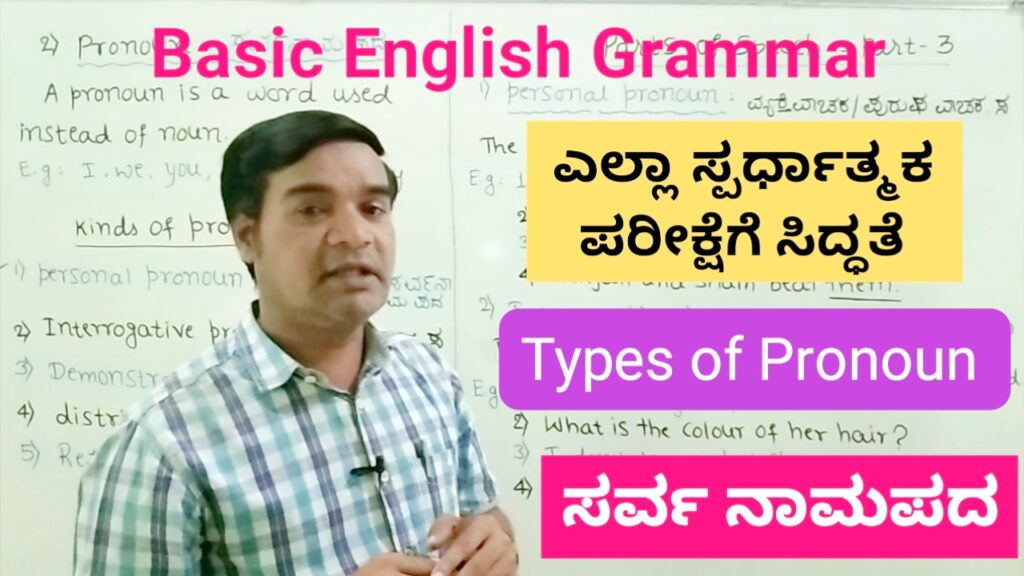What is pronoun?
Pronouns Examples – with Easy Sentences. Pronoun is a word which is used instead of noun. In parts of speech there are 5 types of pronoun. They are as following. Types of Pronouns Examples.
- Personal pronoun
- Interrogative pronoun
- Demonstrative pronoun
- Distributive pronoun and
- Reflective pronoun
Table of Contents
🌟 Pronouns Examples – Simple Guide with Easy Sentences
Ever felt confused when to use he, she, it, or they? Don’t worry — you’re not alone! In this easy guide, we’ll break down pronouns with examples that actually make sense. Whether you’re a student, parent, or learner of English as a second language, this page will help you understand and use pronouns confidently. Pronouns Examples – with Easy Sentences.
✅ What Is a Pronoun?

A pronoun is a word that replaces a noun. We use them to avoid repeating the same names over and over. Pronouns Examples – with Easy Sentences.
🔁 Without pronoun:
Riya loves music. Riya listens to songs every night.
✔️ With pronoun:
Riya loves music. She listens to songs every night.
See how smooth the second one sounds? That’s the power of pronouns!
🔠 Types of Pronouns
1. Personal Pronouns
These refer to people or things and are the most common type.
| Subject | Object |
|---|---|
| I | me |
| you | you |
| he | him |
| she | her |
| it | it |
| we | us |
| they | them |
Examples:
- I am learning English.
- She called me yesterday.
- They are playing football.
2. Possessive Pronouns
They show that something belongs to someone.
| Singular | Plural |
|---|---|
| mine | ours |
| yours | yours |
| his | theirs |
| hers | |
| its |
Examples:
- This bag is mine.
- That bike is theirs.
3. Reflexive Pronouns
Used when someone does something to themselves.
| Singular | Plural |
|---|---|
| myself | ourselves |
| yourself | yourselves |
| himself | themselves |
| herself | |
| itself |
Examples:
- He hurt himself while running.
- We enjoyed ourselves at the event.
4. Demonstrative Pronouns
They point to something specific.
Words: this, that, these, those
Examples:
- This is delicious.
- Those are my shoes.
5. Interrogative Pronouns
These are used to ask questions.
Words: who, what, which, whom, whose
Examples:
- What is your name?
- Who wrote this book?
6. Relative Pronouns
They connect a clause or phrase to a noun or pronoun.
Words: who, which, whose, that, whom
Examples:
- The boy who won is my brother.
- I know a place that serves great food.
7. Indefinite Pronouns
Used when we’re not talking about anyone or anything specific.
Examples: everyone, someone, nothing, few, all, many
Sentences:
- Everyone is ready.
- Someone left their keys here.
💡 Real-Life Pronouns Examples – Simple Guide with Easy Sentences
Here are a few quick examples from everyday English:
- I saw him at the store.
- This is yours.
- We helped ourselves to snacks.
- They told us a funny story.
📘 Summary: Why Pronouns Matter
Pronouns are essential for natural, fluent English. They keep sentences short, clear, and smooth. Once you understand the basic types and how to use them, your speaking and writing will sound way more confident. Pronouns Examples – with Easy Sentences.
✍️ Practice Tip: Pronouns Examples – with Easy Sentences
Try rewriting this sentence using pronouns:
“Rahul went to Rahul’s room because Rahul wanted to sleep.”
➡ Rahul went to his room because he wanted to sleep.
Frequently Asked Questions about Pronouns
What is a pronoun with an example?
A pronoun is a word used in place of a noun to avoid repetition. Example: Instead of saying “Ravi is a student. Ravi likes books,” we say “Ravi is a student. He likes books.”
What are the 7 types of pronouns?
The seven common types of pronouns are: Personal, Possessive, Reflexive, Demonstrative, Interrogative, Relative, and Indefinite pronouns.
What is a personal pronoun example?
Personal pronouns refer to people or things. Examples: I, you, he, she, it, we, they.
Sentence: She is going to the market.
What are 10 examples of pronouns in sentences?
Examples:
- I am learning English.
- She loves ice cream.
- It is raining today.
- We went to the zoo.
- They are my friends.
- This is my book.
- That is interesting.
- Who called you?
- Everyone is invited.
- He did it himself.
What are reflexive pronouns?
Reflexive pronouns refer back to the subject. Examples: myself, yourself, himself, herself, itself, ourselves, themselves.
What is the difference between possessive and personal pronouns?
Personal pronouns refer to people or things (e.g., he, she, it).
Possessive pronouns show ownership (e.g., his, hers, mine).
Example: “She is a doctor.” vs “That book is hers.”
Can pronouns be used for animals or objects?
Yes, we use “it” for animals and things when their gender is unknown or unimportant.
Example: The cat is cute. It is sleeping.
Why do we use pronouns in English?
Pronouns make sentences smoother and avoid repeating the same nouns. They improve clarity and help you speak more naturally.
What is an indefinite pronoun? Give an example.
Indefinite pronouns refer to non-specific people or things. Examples: someone, everybody, none, all.
Sentence: Someone forgot their wallet.
How can I practice pronouns at home?
To practice pronouns:
- Rewrite sentences using pronouns.
- Try grammar quizzes or worksheets.
- Read English books and identify pronouns.
- Write your own short stories replacing nouns with pronouns.
